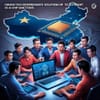Since the Biden administration imposed the chip embargo in October 2022, China's AI companies have been forced to find creative workarounds to access advanced AI capabilities. In response, Chinese companies are developing innovative strategies to optimize their AI models, reducing their dependence on Western chips.
One approach is to write more efficient code, which enables companies like (link unavailable) to develop large language models using limited processing cycles. Others, like Baichuan, are focusing on developing smaller, more specialized AI models that can run locally on edge devices like smartphones and laptops. These models are faster, require less training data, and allow for quicker responses.
Chinese companies are also investing in locally produced chips, reducing their reliance on Western technology. While these chips may be weaker, Chinese companies are finding ways to extract more value from them. Some developers are even shipping large datasets in suitcases to countries like Malaysia to access US-exported Nvidia chips, circumventing export restrictions.
The chip embargo has driven innovation in China's AI sector, pushing companies to develop more efficient and specialized AI models. As a result, China's AI industry is becoming less reliant on Western technology, allowing for greater autonomy in AI development. The solutions developed by Chinese AI companies may benefit the global AI industry, particularly small companies struggling to access advanced chips due to high costs or limited supply.
The US government's efforts to limit China's AI development may ultimately push the industry to become more self-sufficient, potentially altering the global AI landscape. As China's AI industry continues to evolve and adapt to the chip embargo, it is likely to drive further innovation and reduce reliance on Western technology.


